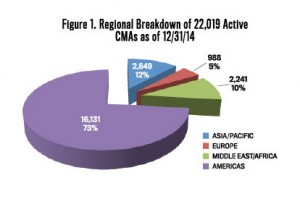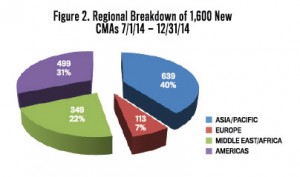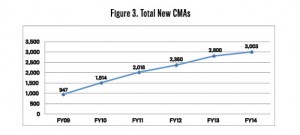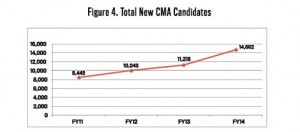Traveling outside your home country requires a passport, a document that verifies your citizenship—including all the rights and privileges that go along with it—and provides access to the wonders of other lands. Over the past two decades, IMA’s CMA® (Certified Management Accountant) certification has evolved into a similar passport—one that attests to a professional’s mastery of a body of knowledge and, equally important, one that opens up global opportunities for those who hold it.
The global growth of the CMA is a relatively new development. Twenty years ago, virtually no CMAs resided outside the United States. But the CMA has expanded its geographic reach and diversity—with CMAs and candidates in more than 100 countries—while remaining primarily a U.S.-based exam.
These assertions are borne out by the latest statistics about the CMA program. Figure 1 shows that, as of December 31, 2014, the Americas (primarily the U.S.) still possess the highest concentration of CMAs, with approximately 73% of the 22,019 total active CMAs located in this region. At the same time, the geographic reach of the exam continues to expand as the number of new CMAs tells a different story: 40% are from Asia/Pacific, 31% from the Americas, 22% from the Middle East, and 7% from Europe (see Figure 2).
Not only has the CMA expanded its global growth, but its absolute growth has accelerated as well. Figure 3 shows the number of new CMAs over the past five years. You can see that this number has increased every year since fiscal 2009, totaling an annualized growth rate of more than 25%. Between this fiscal year and last year, the number was up 7% from 2,800 to a record-high 3,003.
A SUCCESSFUL COMBINATION
The certification’s geographic expansion is the result of many factors—including the translation of the exam into Simplified Chinese in 2007, the opening of IMA offices outside the U.S., the hiring of dedicated international staff for those offices, and IMA’s efforts to engage with other cultures and organizations about the benefits of the certification. The growing popularity of the exam also has been spurred on by recent changes to the exam’s content, which has become more global in nature and portable to companies of any size and economies of any level of development. It is focused on planning, analysis, control, and decision support—skills that are relevant to all companies and that are in great demand on finance teams worldwide.
For those who hold the certification, as well as for those who hire CMAs, this geographic expansion provides numerous benefits. From the individual’s perspective, the globalization of the CMA has made it easier to relocate to or secure a position in another country. The certification provides verification that the individual has acquired a certain skill set and can speak the “language of business,” regardless of the language spoken.
The CMA also adds value to the person who is seeking a management accounting position but has graduated from an educational institution that might not have international name recognition. The CMA is the global passport: recognizable and an affirmation that the individual has met a common standard of excellence for the accounting and finance professional in business.
From an employer’s perspective, this global expansion means that a multinational corporation based in Atlanta, Ga., or a state-owned enterprise in Shanghai, China, can be assured that if they hire a CMA, they are bringing on someone who possesses a certain level of expertise and professional knowledge. Hiring a qualified CMA leads to better business communication and trust when dealing with coworkers, customers, suppliers, and even investors.
GROWING POPULARITY AND PROMINENCE
The popularity of the CMA continues to grow, demonstrated by the number of new CMA candidates, which reached record levels this past fiscal year and has continued to expand significantly since 2011. In fiscal year 2011, there were 8,448 new candidates. By fiscal year 2012, that number had climbed to 10,043 and to 11,218 in fiscal year 2013. By fiscal year 2014, we had acquired 14,662 new candidates, up nearly 31% from last year (see Figure 4).
More CMAs overall means there are more CMAs on staff—on the staffs of multinational organizations as well as small and midsize businesses. With their expertise and abilities, these professionals help improve the finance team’s efficiency, which in turn helps organizations become more competitive and successful. CMAs have the internal controls and risk management skills required to be good stewards of a company’s resources. At the same time, they have the decision analysis and business insight skills to help the company grow in an increasingly complex and globally competitive environment. Having more CMAs helps improve the global economy and create better, more efficient organizations everywhere.
Also, more CMAs means that the name recognition of the certification grows, which helps increase the value of the credential for those who hold it and prompts—and inspires—others to pursue it. That translates into greater earning power, as evidenced year after year by the results of IMA’s Annual Salary Survey. Statistics from the 2014 survey revealed that, despite a fluctuating economy, CMAs around the world earn at least 59% more in median salary and 63% more in median total compensation than their noncertified counterparts (to view the complete global salary survey, visit (www.imanet.org/salary-survey).
We’re truly encouraged by the strong growth and continued geographic diversity of IMA’s certification program. As evidenced by the record-setting numbers, the CMA program is one of the fastest-growing accounting certifications in the world. The CMA program is truly global, and CMAs around the world enrich organizations as well as serve the public interest.
For more information about the CMA program, please visit the IMA website at www.imanet.org/certification.asp.
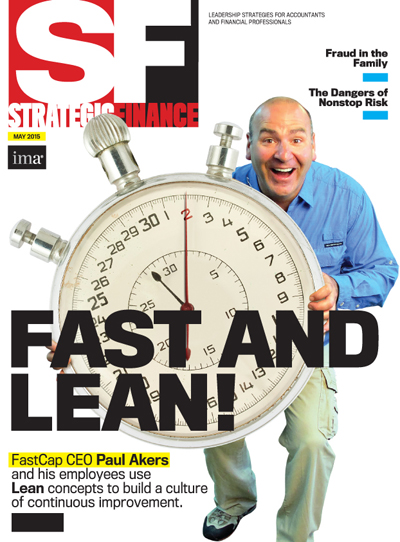
May 2015


